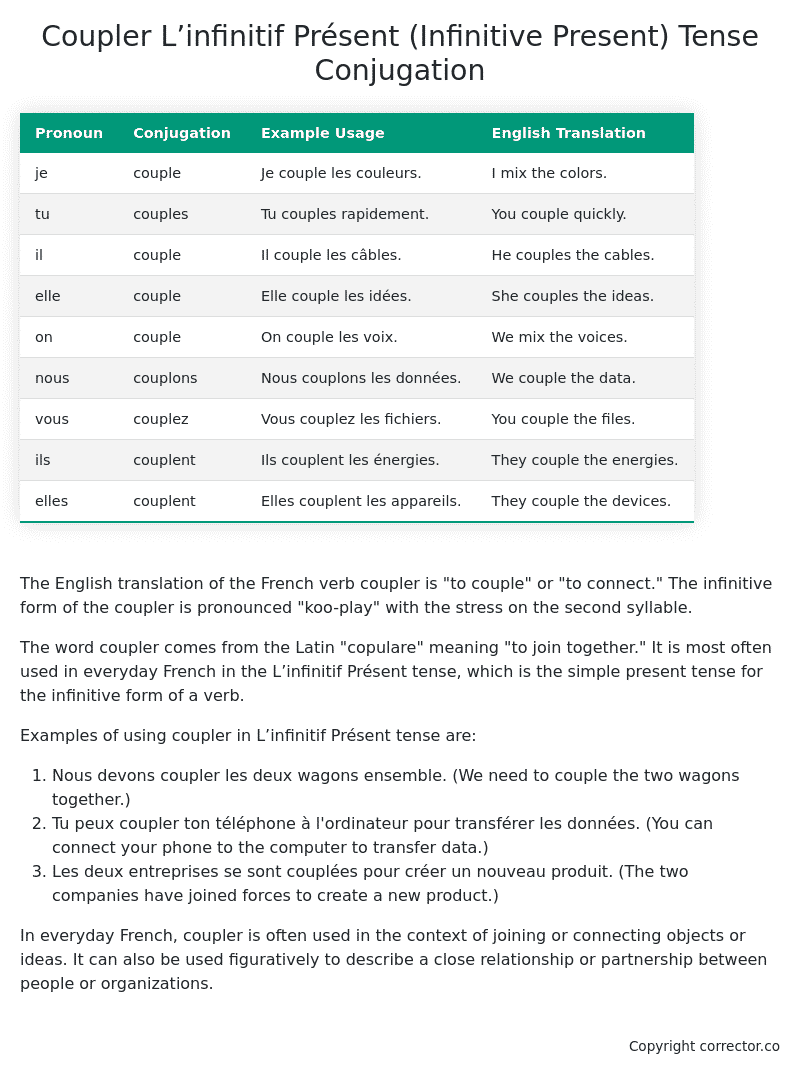L’infinitif Présent (Infinitive Present) Tense Conjugation of the French Verb coupler
Introduction to the verb coupler
The English translation of the French verb coupler is “to couple” or “to connect.” The infinitive form of the coupler is pronounced “koo-play” with the stress on the second syllable.
The word coupler comes from the Latin “copulare” meaning “to join together.” It is most often used in everyday French in the L’infinitif Présent tense, which is the simple present tense for the infinitive form of a verb.
Examples of using coupler in L’infinitif Présent tense are:
- Nous devons coupler les deux wagons ensemble. (We need to couple the two wagons together.)
- Tu peux coupler ton téléphone à l’ordinateur pour transférer les données. (You can connect your phone to the computer to transfer data.)
- Les deux entreprises se sont couplées pour créer un nouveau produit. (The two companies have joined forces to create a new product.)
In everyday French, coupler is often used in the context of joining or connecting objects or ideas. It can also be used figuratively to describe a close relationship or partnership between people or organizations.
Table of the L’infinitif Présent (Infinitive Present) Tense Conjugation of coupler
| Pronoun | Conjugation | Example Usage | English Translation |
|---|---|---|---|
| je | couple | Je couple les couleurs. | I mix the colors. |
| tu | couples | Tu couples rapidement. | You couple quickly. |
| il | couple | Il couple les câbles. | He couples the cables. |
| elle | couple | Elle couple les idées. | She couples the ideas. |
| on | couple | On couple les voix. | We mix the voices. |
| nous | couplons | Nous couplons les données. | We couple the data. |
| vous | couplez | Vous couplez les fichiers. | You couple the files. |
| ils | couplent | Ils couplent les énergies. | They couple the energies. |
| elles | couplent | Elles couplent les appareils. | They couple the devices. |
Other Conjugations for Coupler.
Le Present (Present Tense) Conjugation of the French Verb coupler
Imparfait (Imperfect) Tense Conjugation of the French Verb coupler
Passé Simple (Simple Past) Tense Conjugation of the French Verb coupler
Passé Composé (Present Perfect) Tense Conjugation of the French Verb coupler
Futur Simple (Simple Future) Tense Conjugation of the French Verb coupler
Futur Proche (Near Future) Tense Conjugation of the French Verb coupler
Plus-que-parfait (Pluperfect) Tense Conjugation of the French Verb coupler
Passé Antérieur (Past Anterior) Tense Conjugation of the French Verb coupler
Futur Antérieur (Future Anterior) Tense Conjugation of the French Verb coupler
Subjonctif Présent (Subjunctive Present) Tense Conjugation of the French Verb coupler
Subjonctif Passé (Subjunctive Past) Tense Conjugation of the French Verb coupler
Subjonctif Imparfait (Subjunctive Imperfect) Tense Conjugation of the French Verb coupler
Subjonctif Plus-que-parfait (Subjunctive Pluperfect) Tense Conjugation of the French Verb coupler
Conditionnel Présent (Conditional Present) Tense Conjugation of the French Verb coupler
Conditionnel Passé (Conditional Past) Tense Conjugation of the French Verb coupler
L’impératif Présent (Imperative Present) Tense Conjugation of the French Verb coupler
L’infinitif Présent (Infinitive Present) Tense Conjugation of the French Verb coupler (this article)
Struggling with French verbs or the language in general? Why not use our free French Grammar Checker – no registration required!
Get a FREE Download Study Sheet of this Conjugation 🔥
Simply right click the image below, click “save image” and get your free reference for the coupler L’infinitif Présent tense conjugation!

Coupler – About the French L’infinitif Présent (Infinitive Present) Tense
Forming the Infinitive Present
Common Everyday Usage Patterns
As a Verb’s Dictionary Form
After Modal Verbs
As an Imperative
In Infinitive Clauses
Interactions with Other Tenses
Present Tense
Future Tense
Conditional Tense
Passé Composé
Imperfect Tense
Subjunctive and Conditional Moods
Summary
Want More?
I hope you enjoyed this article on the verb coupler. Still in a learning mood? Check out another TOTALLY random French verb conjugation!


